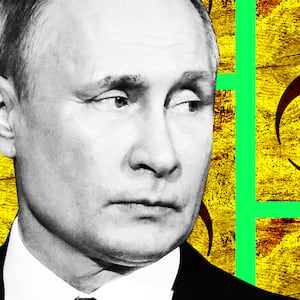One of the people kicked off Facebook last week for pushing Russian propaganda isn’t going away quietly. He says he’s being singled out by Team Zuckerberg, not for circulating Kremlin hoaxes under a false identity but for using a simple pen name that wasn’t intended to mislead anyone.
“Denying anonymity to people involved in the media and activism is repressive and either excludes people, marginalizes them, or endangers them,” said “Anthony Cartalucci” in an email interview with The Daily Beast.
Cartalucci is a writer for New Eastern Outlook, a publication of the government-chartered Russian Academy of Sciences in Moscow. NEO is one of Russia’s less-concealed outlets for propaganda and disinformation. One notorious 2016 article headlined “Top USA National Security Officials Admit Turkey Coup,” was an entirely made-up story that enjoyed wide pickup on Turkish social media, according to a study by the RAND Corporation. A 2018 Senate report found the site has also successfully sowed Russian propaganda in Hungary. And until last year, some of its content was targeted to reach American veterans through another website called Veterans Today.
Cartalucci’s stories strike all the most familiar notes from the Kremlin’s disinfo songbook: the U.K.’s account of the “alleged poisoning” of Sergei Skripal doesn’t add up; Russia’s election interference campaign was “crude, baseless propaganda” by U.S. war hawks; the Assad regime’s chemical weapons attack in Douma was a “false flag” hoax staged by U.S.-backed militants; the Syrian White Helmets are “an acting troupe.”
On Thursday, Facebook announced that as part of a broader takedown it had removed 12 Thailand-focused accounts and 10 Facebook pages for “coordinated inauthentic behavior,” including a page that Cartalucci has maintained for 10 years to promote his writing. “Our review found that some of this activity was linked to an individual based in Thailand associated with New Eastern Outlook, a Russian government-funded journal based in Moscow,” the company wrote.
The page was titled “Anthony Cartalucci,” which Cartalucci admits is not his real name. But where most fake personas vanish into the shadows after a social media takedown, Cartalucci is still around, arguing on his blog that he did nothing wrong by setting up a Facebook page under a brand he’s maintained for a decade.
“I use Cartalucci to sign all my articles,” he wrote to The Daily Beast. “The ‘fictitious persona’ and ‘Russian agent’ talking points have been arguments people who disagree with my politics have used to smear, attack, and censor me for years.”
Cartalucci doesn’t dispute that NEO is a Russian government publication but says that is immaterial. “How is it different than the BBC or the Atlantic Council besides the fact that NEO didn’t lie about WMDs in Iraq and trigger a war that killed a million people including thousands of U.S. troops?”
Twitter also closed Cartalucci’s account on that platform, and both Facebook and Twitter shut down the official accounts for New Eastern Outlook. Facebook didn’t respond to an inquiry for this story.
Cartalucci’s argument draws on a long history of authors from Mark Twain to Dr. Seuss who became famous under a nom de plume. The Economist magazine, which doesn’t use bylines at all, is another example, he argued. “The only difference between what I did and what The Economist does is our content,” he said.
The “pen name” argument is a novel response to Facebook’s post-2016 rehabilitation efforts. It comes on the heels of a federal court ruling in San Francisco dismissing a lawsuit filed against Facebook by the Federal News Agency, or FAN, a St. Petersburg organization with links to Russia’s notorious troll farm.
FAN had sought to use American courts to force Facebook to reinstate its own banned accounts, arguing, among other things, that the ban violated the Russian organization’s First Amendment rights. That argument failed because the First Amendment protects against government encroachment on free speech, and Facebook isn’t a government.
“Plaintiffs do not allege that Facebook assumes all of the attributes of a state-created municipality or that Facebook was performing the full spectrum of municipal powers and stood in the shoes of the state,” wrote U.S. District Judge Lucy Koh in the ruling.
Cartalucci’s argument that he was using a pen name, not a fake one, likely has no legal significance, and he hasn’t threatened to sue. But in conjunction with FAN’s failed lawsuit, it augurs an era where at least some accused Russian trolls stick around and defend themselves long after they’ve been called out and blocked.






